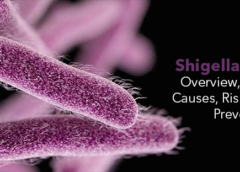Overview
Shigella infection (shigellosis) is an intestinal disease caused by the shigella family of bacteria. Diarrhoea is the main symptom of shigella infection, which is frequently bloody.
Shigella may be spread by direct contact with the stool bacteria. This may occur in childcare environments, for instance, when staff members do not wash their hands well enough after changing the diapers or supporting toilet-training infants. Shigella bacteria may also be passed into infected food, or polluted water through drinking or swimming.
Children under the age of 5 are more likely to be diagnosed with shigella but it can occur at any age. Typically, a mild case clears up by itself within a week. Doctors usually prescribe antibiotics when treatment is required.
Symptoms ofShigella Infection
Shigella infection signs and symptoms normally begin a day or two after shigella contact but can take up to one week to develop. Signs and symptoms may include:
- Diarrhea (mostly containing blood or mucus)
- Abdominal pain or cramps
- Fever
While some people have no symptoms following Shigella infection, their faeces can still be infectious for up to a few weeks.
When to see a doctor
If you or your child has bloody diarrhoea or diarrhoea that is serious enough to cause weight loss and dehydration contact your doctor or seek urgent treatment. Remember, if you or your child has diarrhoea and a fever of 101 F (38 C) or higher, call your doctor.
Causes
Infection happens when bacteria from shigella are mistakenly swallowed. It may happen if you:
Touch your mouth: If you do not wash your hands well after changing a child’s diaper that has a shigella infection, you may become infected. The most common method of transmitting the disease is direct person-to-person communication.
Eat contaminated Food: Infected people handling food may pass the bacteria on to people who consume the food. Food can also become contaminated if it grows in a field that contains sewage.
Swallow Contaminated Water: Water can become infected by sewage or by someone with Shigella infection swimming on it.
Risk factors
Age: Infant under the age of 5 are more likely to be diagnosed with shigella but it can occur at any age.
Living arrangements and activities: Close contact with others allows the bacteria to spread from person to person. Outbreaks of Shigella are more in childcare centres, community wading pools, nursing homes, hospitals and military barracks.
Time spent in areas that lack sanitation: People living or travelling in developing countries are more likely to acquire shigella infection.
Men who have sex with men: Men who have sex with men are at greater risk due to oral-anal direct or indirect contact.
Complications
Shigella Infection typically clears up without complications, but it may take weeks or months for the bowel habits to normal.
Complications can include:
Dehydration: Constant diarrhoea can lead to dehydration. Symptoms include lightheadedness, dizziness, child lack of tears, sunken eyes, and dry diapers. High dehydration can cause shock and death.
Seizures: Any kids who have a shigella infection experience high fevers and seizures. This is not clear the convulsions are the result of fever or the shigella infection itself. If your child has a seizure, immediately contact your doctor
Rectal Prolapse: In this condition discomfort during bowel movements may cause the mucous membrane or rectum lining to pass through the anus.
Hemolytic Uremic Syndrome: An unusual and complex condition of shigella, caused more often by the bacteria E. coli, can result in red blood cell counts (hemolytic anaemia), low platelet counts (thrombocytopenia), and acute kidney failure.
Toxic Megacolon: This unusual condition happens when the colon is paralyzed, preventing movement of the intestine or stop passing gas. Symptoms and symptoms include abdominal pain, swelling, fever and fatigue. If you don’t get toxic megacolon treatment, your colon can break open (rupture), cause peritonitis, and a life-threatening infection that needs emergency surgery.
Reactive Arthritis: Reactive arthritis develops in response to an infection. Signs and symptoms include joint pain and inflammation, usually in the ankles, knees, feet and hips; redness, itching and discharge in one or both eyes (conjunctivitis); and painful urination (urethritis).
Prevention
Although researchers continue their work to develop a Shigella vaccine, nothing is available yet. To prevent the spread of shigella:
- Wash hands frequently and thoroughly
- Watch young children when they wash their hands
- Dispose of soiled diapers properly
- Disinfect diaper-changing areas after use
- Don’t prepare food for others if you have diarrhoea
- Children who have diarrhoea keep away them from childcare, playing groups or school
- Avoid drinking water of ponds, lakes or untreated pools
- Avoid sexual activity with anyone who has diarrhoea or who has recently recovered from diarrhoea.

Leave a Reply
You must be logged in to post a comment.